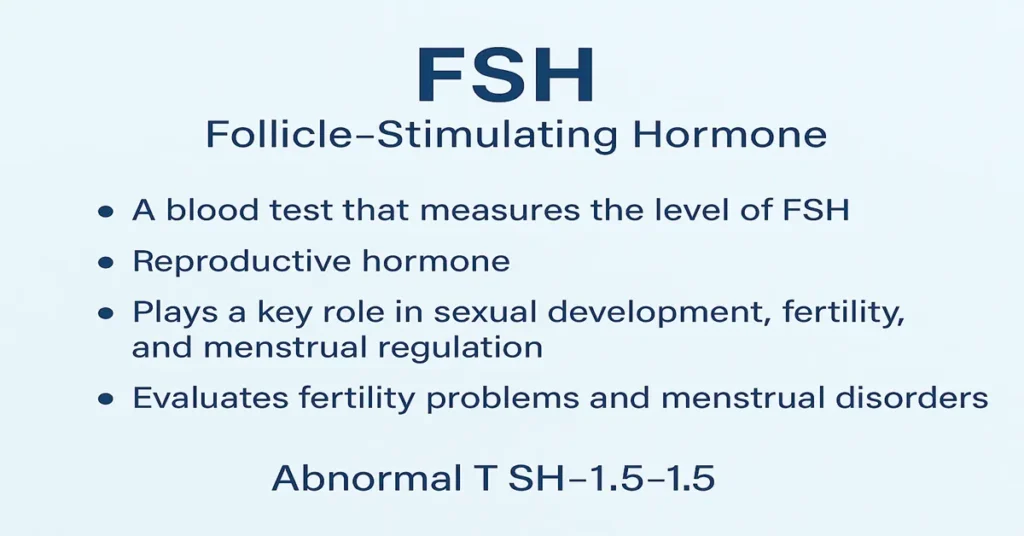Introduction
The FSH test (Follicle-Stimulating Hormone test) is a blood test used to measure the level of FSH hormone in your bloodstream.
FSH is one of the key reproductive hormones that play an important role in sexual development, fertility, and menstrual cycle regulation. It helps control the growth of eggs in the ovaries in females and sperm production in the testes in males.
Doctors usually recommend an FSH test to evaluate fertility problems, irregular periods, puberty-related issues, or pituitary gland disorders that affect hormone balance.
What is FSH?
FSH (Follicle-Stimulating Hormone) is a hormone produced by the pituitary gland, located at the base of your brain. It is released in response to another hormone called GnRH (Gonadotropin-Releasing Hormone), which comes from the hypothalamus.
Together with LH (Luteinizing Hormone), FSH plays a major role in the reproductive system and sexual development of both men and women.
- In women, FSH controls the growth of ovarian follicles and supports estrogen production.
- In men, it stimulates sperm production in the testes.
The FSH test helps detect hormonal imbalances, fertility issues, or abnormalities in the pituitary or gonads (ovaries/testes).
Where is FSH Produced in the Body?
FSH is produced and secreted by the anterior pituitary gland, a small gland at the base of your brain.
The release of FSH is regulated by GnRH (Gonadotropin-releasing hormone) from the hypothalamus. Once released into the bloodstream, FSH travels to:
- The ovaries in females
- The testes in males
This hormonal communication between the brain and reproductive organs ensures proper sexual function, fertility, and puberty.
Functions and Importance of FSH
In Females:
- Stimulates ovarian follicles: FSH helps the growth and maturation of ovarian follicles that contain eggs.
- Supports estrogen production: It promotes estrogen secretion from developing follicles.
- Regulates menstrual cycle: Works with LH to control the timing of ovulation and maintain reproductive health.
- Prepares the body for ovulation: FSH and LH work together to trigger egg release during ovulation.
In Males:
- Stimulates sperm production: FSH activates Sertoli cells in the testes to support sperm formation (spermatogenesis).
- Supports testicular growth: Essential for testicular development during puberty.
- Maintains fertility: Ensures continuous sperm production throughout adulthood.
Overall, FSH is vital for puberty, sexual maturity, fertility, and hormonal balance in both men and women.
Causes of Low FSH Levels
Low levels of FSH generally indicate that the pituitary gland or hypothalamus is not functioning properly, preventing the normal release of reproductive hormones.
Common Causes:
- Pituitary gland dysfunction (damage, tumor, or failure)
- Hypothalamic disorders (reduced GnRH release)
- Hypogonadotropic hypogonadism (low GnRH and FSH)
- Stress or undernutrition
- Excessive physical training or overexercise
- PCOS (Polycystic Ovary Syndrome): May cause mildly low or normal FSH.
- Use of medications: Birth control pills, steroids, or hormone therapy.
- Prolactinoma: Pituitary tumor producing high prolactin levels that suppress FSH.
Symptoms of Low FSH Levels
In Females:
- Irregular or absent menstrual periods
- Difficulty conceiving (infertility)
- Delayed puberty
- Hot flashes or vaginal dryness (due to low estrogen)
In Males:
- Low sperm count
- Infertility
- Delayed puberty
- Decreased muscle mass
- Reduced facial and body hair
- Low energy or reduced libido
Low FSH often points toward pituitary or hypothalamic disorders, which require hormonal evaluation and medical supervision.
Causes of High FSH Levels
High FSH levels typically occur when the ovaries or testes fail to function properly, causing the pituitary gland to release more FSH in compensation.
Common Causes:
- Primary ovarian failure: Due to premature menopause or Turner syndrome.
- Menopause: Natural loss of ovarian function increases FSH levels.
- Testicular failure: From genetic causes such as Klinefelter syndrome.
- Ovarian/testicular damage: Following surgery, chemotherapy, or radiation.
- Certain genetic or autoimmune disorders.
- Puberty disorders: Early onset of puberty in children.
Symptoms of High FSH Levels
In Females:
- Menopause symptoms (hot flashes, mood swings, night sweats)
- Irregular or missed periods
- Infertility
- Vaginal dryness
- Low estrogen levels
In Males:
- Low testosterone levels
- Infertility
- Smaller testes
- Reduced energy, muscle strength, or libido
Persistently high FSH levels can indicate gonadal failure (ovarian or testicular dysfunction).
Reference (Normal) Ranges
(Note: FSH levels vary by age, gender, and menstrual phase.)
Females:
- Follicular phase: 3.5 – 12.5 mIU/mL
- Ovulation phase: 4.7 – 21.5 mIU/mL
- Luteal phase: 1.7 – 7.7 mIU/mL
- Postmenopausal: 25.8 – 134.8 mIU/mL
Males:
- 1.5 – 12.4 mIU/mL
Children (Pre-puberty):
- Usually < 3.0 mIU/mL
Sample Type
- Sample Type: Serum (blood sample)
- Tube Used: Red Top (Plain) or SST (Serum Separator Tube)
- Fasting Requirement: Not required (unless instructed by your doctor).
Test Preparation
The FSH test is simple and requires no fasting. However:
- Inform your doctor about any hormone medications or supplements (especially birth control).
- For females, the timing of the test may depend on the menstrual cycle phase.
- Blood is drawn from a vein in your arm, and results are usually ready within 24 hours.
When to Consult a Doctor
You should see a doctor if you notice:
- Irregular or absent periods
- Difficulty conceiving
- Signs of early or delayed puberty
- Low libido or sexual dysfunction
- Unexplained fatigue or hot flashes
Your doctor may advise an FSH, LH, estrogen, testosterone, or prolactin test for a complete hormonal assessment.
Important Word Explanations
- FSH (Follicle-Stimulating Hormone): Hormone controlling egg/sperm development.
- LH (Luteinizing Hormone): Works with FSH to regulate ovulation and testosterone.
- GnRH: Hormone from hypothalamus that signals the pituitary to release FSH/LH.
- Pituitary Gland: Small gland at the base of the brain that controls hormones.
- Ovaries/Testes: Reproductive organs that produce eggs/sperm and sex hormones.
- Hypogonadism: Reduced function of gonads, causing low hormone levels.
~END~

